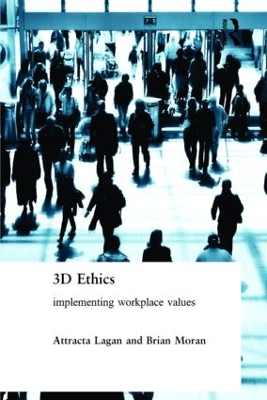Annotation Who governs corporate behaviour? ♯#61554; Does your CSR statement match your corporate practice, when the law fails? ♯#61554; Does your corporate practice meet your customers ethical expectations? ♯#61554; Are your employees proud to be associated with your values and behaviour? ♯#61554; How do your shareholders respond to your governance and corporate ethics? Waves of corporate and political scandals highlight how institutionalised greed has made corporate ethics everyone s concern. Celebrity court cases indicate the potential of socially irresponsible corporations to cause increasing physical, mental and financial injury to employees, customers, the community, small shareholders and the natural environment. Three Dimensional Ethics (ISBN 0-9757422-3-X) by Lagan and Moran demonstrates how (1) personal, (2) professional and (3) societal dimensions of business ethics may influence company directors, CEOs, CSR directors, HR, OH&S and environmental managers in their implementation of workplace values: Who decides what is ethical? Changing societal values and the rise of stakeholder capitalism Governance, corporate social responsibility (CSR) and employee accountability Context, challenge and consent Multiple ethical perspectives Becoming comfortable with the ethical dimension Virtue ethics and the rise of the Meaning economy Ethics and doing business in China In Three Dimensional Ethics: Implementing Workplace Values these three dimensions of ethics converge into a connected whole. Their effective application improves performance outcomes through: consistent and predictable corporate behaviour of benefit to shareholders; alignment to representative personal, workplace and democratic values; meeting the expectations of employees, business leaders, communities and society. Ethics is not just about morality; it is about managing the complex values of personal andcorporate life. Without national boundaries or electorates, the global commons is being shaped by corporations unelected by democratic processes. Who determines which citizens benefit, how are privatised public assets distributed and what human rights are enshrined in the global workforce? Business now has the potential to enhance or destabilise social progress in equal measure. In Three Dimensional Ethics, Lagan and Moran seek to apply that potential in business to realise each dimension of human capability in corporate performance by providing a guide to building well governed, profitable corporations that contribute to the well-being of our emerging global society, our citizens and our shared natural resources.
Annotation In this book, we have suggested that there are three distinct levels or dimensions of ethics and it is impossible, in the connected world of the early 21st. century, to contemplate one without recognising the influence on and by the other two. Personal ethics cannot be separated from the organisational context in which most of us are destined to spend the majority of our lives, be it working for a multinational corporation, a government department or agency, a not-for-profit organisation or simply volunteering at the local pre-school. Humans are gregarious by nature and seek out the company of other humans in communities that are increasingly focused around the workplace. Similarly, organisations have to be sympathetic to the values and expectations of the wider societal context in which they are embedded. But we would suggest that there is in fact a fourth dimension a parallel world, if you like, which sits alongside our present world - and that is the future world. Eminent mythologist Joseph Campbell suggests that, when we humans have children, we ourselves begin to die. In saying that, he is suggesting that the introspective, inner world that we inhabit as solo human beings changes forever when we have children and our focus turns towards them and their life begins where ours has now left off. Suddenly we are faced with the awful thought that we will be succeeded by this person we have created, we are less important in the wider scheme of things than our heir and successor and she/he will outlive us. The fourth dimension, therefore, belongs to tomorrow s generations and consists of our ethical accountabilities to those who cannot speak for themselves. It includes what s left of the natural world as well as the health of the economic, social and spiritual orders bequeathed to them. Surely we have a duty, an ethical responsibility, to patrol the boundariesof the society we are custodians of for our children and our children s children? IBM became the most powerful corporation in the world because they had a philosophy of passing the baton from leader to leader. They had a philosophy that the current leader was simply the custodian of the corporate culture and it was his (they were all men in those days) responsibility to protect this precious flower for the next generation. IBM endured for over a century of change because of that philosophy and the culture remained intact for several decades. The built to last companies of today share a similar philosophy. This responsibility to future generations is often referred to in the notion of intergenerational equity . In the context of sustainability it is used to describe the responsibility of present generations to safeguard the interests of future generations and the World Business Council for Sustainable Development defines sustainability as forms of progress that meet the needs of the present without compromising the ability of future generations to meet their needs . Attracta Lagan and Brian Moran, November 2005.
- ISBN10 097574223X
- ISBN13 9780975742235
- Publish Date 1 January 2006
- Publish Status Active
- Publish Country AU
- Imprint eContent Management Pty Ltd
- Format Hardcover
- Pages 184
- Language English
